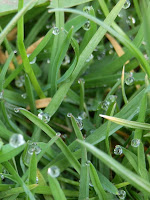Monday, August 10, 2015
April Showers Drought
Aren't we lucky.All we have to do to maintain our water supply through the previous 2 years of drought conditions is to just not use our hose pipes. Looking back in time human populations would have to adapt to a severe lack of water - or move on. Some people in the world still do have to move on and there are many animal populations that have migratory patterns that are driven by the search for water, such as the majestic elephant.
All we have to do is refrain from using our hose pipes.
Yet I've heard people complaining.
Sometimes from the ones that haven't taken the recent opportunity to collect as much water as possible with the wonderful water dump that April brought us! I know that there are many reasons why people either didn't have the time or the resources, but like the saying goes 'if you don't vote, you can't complain' (I don't know if that is an actual saying, but I've heard similar!). Our smallest watering can is about half a litre - but it's better than nothing. Luckily we have a water butt, a bucket and a standard watering can - so we're all good on the water front.
There are now adverts on the radio saying that it was great that we had loads of rainfall in April, but we've 2 years of rainfall to catch up on. So how much rainfall did we actually have in April and how does this compare to the previous 2 years?
Well when looking at climate, an averaging period is used. The averaging period is always a 30 year period and currently this is 1971-2000. The next averaging period will be 1981-2010 and the Met Office advise that they should be moving across to this during 2012.
The Met Office gives the total rainfall in 2010 of 951 mm which was 84% of the average rainfall recorded during the current 1971-2000 averaging period. In 2011 the average looks better at 1166 mm, which over the whole of the UK is 104% of the average. But the 2011 average masks the fact that most of the UK had less than 95% of the average, with Scotland and Northern Ireland being the main places that had from 100% up to over 135% of the average when looking at the climate data of 1971-2000. Therefore looking at 2010 and 2011, 2117 mm of rain fell on our wonderful country of countries.
April 2012 saw 126.5 mm fall, which is nearly 6% of the total rain that fell in 2010 and 2011!
 |
| A thunder storm that we had during the incessant April rain. |
So we can see that a lot of rainfall has occurred recently - but unfortunately the rain doesn't all fall into the resevours. The water from rainfall contributes to many aspects of the geology that it falls on and the Environment Agency look at the following when reporting on the data received:
1. Rainfall - Simply the amount of rain that fell during the reporting period.
2. Soil moisture deficit - As I understand it, this is the amount of water soil can hold without gravity forcing the water out at the bottom.
3. River flows - How high of low the flow of water in the rivers are, for instance if the flow is low or high, along with the % compared to the averaging period.
4. Groundwater levels - This is water that is held in spaces between the soil and fractures in the rock formations. This is the mineral water that you buy by the bottle for an extortionate amount of money!
5. Reservoir stocks - last but not least the amount of water available in the reservoirs for our use. These are the artificial lakes that are created - sometimes by damming a river valley.
As we can see, if any of the above have levels that are too low, then rainfall may be naturally diverted to create an equilibrium, especially with the river levels, groundwater and the reservoir levels. Until this happens, we'll be in drought. And yes, it's a bit annoying. But as long as we think about the water we're using and ensure we keep it to a comfortable minimum then we'll be fine.
On the positive side - in times of drought it's best to leave the grass longer between cuts - can't ask for better than that!
To see the data for yourself, click the following link to the Environmental Agency.
Subscribe to:
Post Comments (Atom)


No comments:
Post a Comment